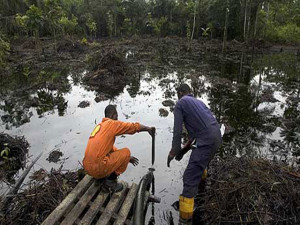Communities in the Niger Delta region of Nigeria are seeking government intervention in the protection and conservation of the rich biodiversity presence in the area.

Members of the communities made the request recently during an interaction with a team comprising officials of the Ministry of Environment, National Planning Commission, non-governmental organisations (NGOs) and the coordinator of the United Nations Development Programme (UNDP) funded Niger Delta Biodiversity Project (NDBP), Dr Mathew Dore. The team was on a monitoring and evaluation visit.
The Niger Delta Biodiversity Project has the goal of contributing to the conservation and sustainable use of globally significant biological diversity in the Niger Delta, which is being attained through stakeholders strengthening of the governance framework of law, policy and institutional capacity to enable the mainstreaming of biodiversity management into the oil and gas sector in the restive, oil-rich region.
Local folks noted that the best way to halt the indiscriminate exploitation and destruction of the biodiversity is for the communities, government and the oil companies to work in synergy in addressing the situation.
In Biseni community of Bayelsa State, the community decries the disappearance of some of animal and plant species which was hitherto common in their forests.
“As a result of oil exploration and exploitation, pipe line vandalism and over harvesting of animals for meat and plant fruits for food, we have succeeded in depleting the forests of valuable biodiversity that should sustain life for us now and future generation,” Mr Ndiwari Bulodisiye, a community member, said.
“There is an urgent need to conserve and protect the biodiversity and no community in the Niger Delta has the capacity or potential to do that. So we need government and more especially the oil companies to partner communities in bringing back lives into the forests,” he added.
Mr Gbabra Yoruba, a representative of the Niger Delta Wetland Centre in Yenagoa, Bayelsa State, which prepared the Biseni Community Biodiversity Action Plan, said that more than 80 per cent of the community depends on biodiversity from the forest for its livelihood.
“Members of the community have also recognised and admitted that they are to some extent responsible for the rapid loss of biodiversity and that they have done little or nothing for its protection,” he added.
Mr Otufu Pasuja of the Department of Animal and Environmental Biology, University of Port Harcourt, described the Niger Delta Biodiversity Project as a big boost to efforts by communities in the area to preserve their natural heritage.
“Bayelsa is so rich in terms of biodiversity; conserving it will be making room for the next and future generation. But there is the need for the political will on the part of government and commitment on the part of oil companies for any effort at conserving this God gift to be a success,” Pasuja said.
In Abi-Ugborodo community in Warri North Local Government Area of Delta State, Mr Sunday Agbeyi, chairman of the community biodiversity action plan, said the environmental degradation suffered by the area leading to loss of biodiversity would be a thing of the past if the community’s action plan to restore the environment was implemented.
He urged the state government to come up with laws and regulations that would protect the rich biodiversity of the area.
Mr Irikefe Dafe, Executive Director, Foundation for Conservation of Nigerian Rivers, a non-governmental organisation and the implementing organisation for the Abi-Ugborodo conservation project under the NDBP, noted that the chimpanzee and other animal and plant species that are common in the place are now extinct following massive deforestation and other human induced activities.
He praised the community for embracing the project and urged members to reduce activities that result in the loss of biodiversity.
Emmanuel Bazunu of the Delta State Ministry of Environment and Conservation noted that the Niger Delta area had suffered severe loss of biodiversity as a result of pollution which government had failed to control.
Mr Eguaoje Festus, Assistant Director, Federal Ministry of Environment, said government was concerned about the huge biodiversity loss in the Niger Delta and was prepared to work with communities and development partners to restore the losses.
Mrs Falilat Abdulraheem, an Assistant Director with the National Planning Commission, urged the Niger Delta communities to toe the path of sustainable development by protecting and conserving nature’s gift to them.
She noted that the environment had been over-exploited and therefore required a systematic approach and involvement of all to ensure its restoration.
